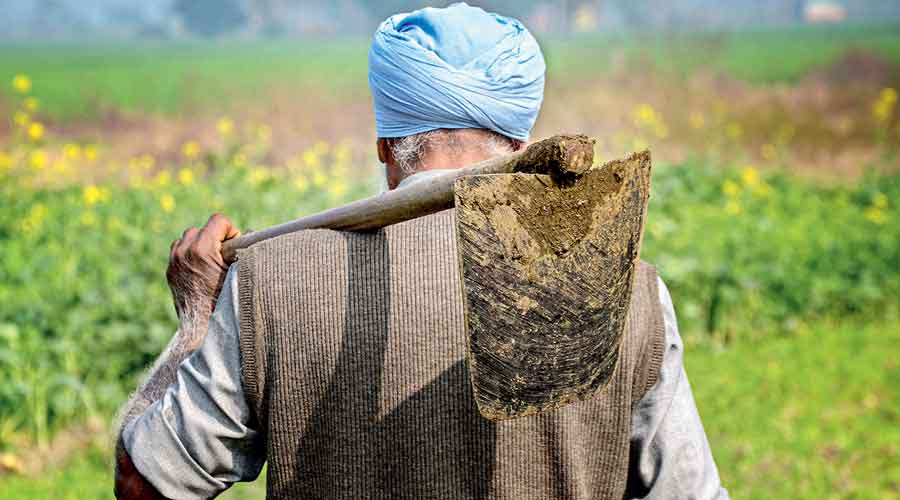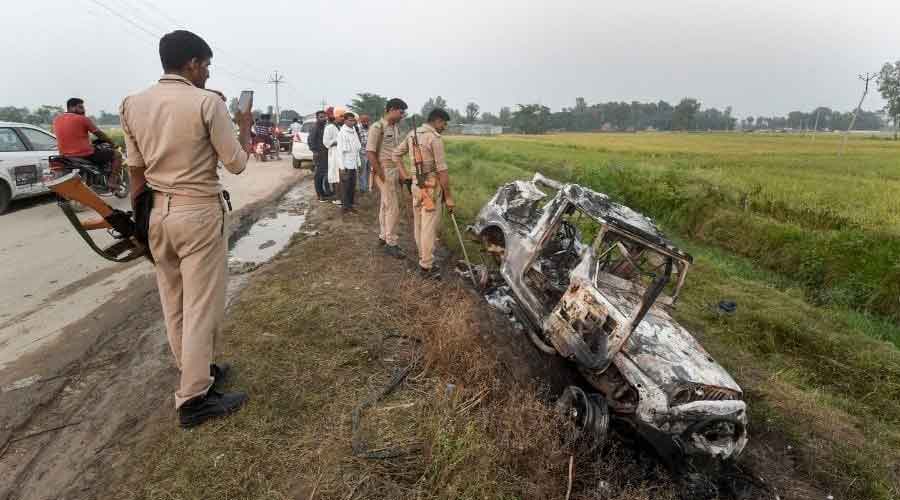Farmers’ organisations on Tuesday saw in the Union budget an act of vengeance by the Narendra Modi government on the farming community for their yearlong agitation that had forced the repeal of three farm laws.
Not only did agriculture get merely a fleeting mention in finance minister Nirmala Sitharaman’s 90-minute budget speech, the allocations for the sector had been cut, including that for procurement. And the government was silent on the promise of doubling farmers’ income by 2022.
The Samyukta Kisan Morcha, the collective leadership that spearheaded the farmers’ agitation, said the government had betrayed the farmers once again, and that the budget was a call for the farmers to intensify the movement for a law guaranteeing minimum support prices (MSPs) for their crops. It asked farmers to prepare for another struggle.
With elections approaching in five states including the crucial heartland of Uttar Pradesh, the farmers had hoped the government would be sensitive to their requirements.
“Instead, the government reduced the share of agriculture and allied activities in the total budget from 4.3 per cent last year to 3.8 per cent this year, showing that it wants to punish the farmers for their successful movement,” the Morcha said in a late evening statement.
Soon after Sitharaman wrapped up her budget speech, individual farmer unions had set the narrative about the government seeking revenge for having had to roll back the farm laws.
First off the mark was Yogendra Yadav of the Jai Kisan Andolan, a member of the Morcha.
“This budget is a revenge on the farmers for leading a successful movement against the anti-farmer three laws…. Unbelievable! Overall budget of agriculture and allied activities has dropped! From 4.26% previous year to 3.84% now. Let them eat drones!”
he said in a series of tweets and followed it up with a news conference detailing the cuts.
The Left-oriented All India Kisan Sabha, another Morcha constituent, echoed the charge of the budget being an act of revenge while arguing that Sitharaman’s efforts to hype the procurement numbers did not stand scrutiny.
“The finance minister Nirmala Sitharaman has sought to create hype that (Rs) 2.37 lakh crore is set aside for procurement of paddy and wheat in 2022-23,” it said.
The Kisan Sabha said: “In fact this is lesser than the allocation of (Rs) 2.48 lakh crore made last year and the beneficiaries will also be drastically reduced to 1.63 crore only while beneficiaries last year were 1.97 crore; an exclusion of 34 lakh farmers while we have been demanding expansion to all crops and widening of the reach.”
“The allocation for procurement to the FCI (Food Corporation of India) and under the decentralised procurement scheme has actually been reduced by a whopping 28 per cent.”
Also, the fertiliser subsidy has been reduced by 25 per cent. “Coming as it does when already fertiliser prices are shooting up, this is going to have an adverse impact on productivity,” the Kisan Sabha warned.
The other heads where allocation has been reduced include the Pradhan Mantri Fasal Bima Yojana and PM Kisan.
Kiran Kumar Vissa, co-founder of the Rythu Swarajya Vedika, questioned the government’s silence on doubling the farmers’ income, which was to have been achieved by now going by then finance minister Arun Jaitley’s announcement in the 2016 budget speech.
Had the promise been achieved, the farmers’ average income by now should have been Rs 21,146 a month with inflation factored in. But the projection for 2022 stands at Rs 12,952.
“Such hype, such failure!” Vissa tweeted.
The Alliance for Sustainable and Holistic Agriculture (Asha) noted: “While it is good that the government desisted from its usual jumlabaazi (hyperbole), it is also clear that farmers have not obtained anything solid in this budget despite agriculture being a saviour sector of the economy during the pandemic.
“In fact, by not keeping the agriculture-related allocations at the same proportion as last year in the overall budget (which itself was inadequate), at least Rs 16,000 crore have been denied to the sector in this year’s budget.”
Asha too flagged the government’s doublespeak on MSP, underscoring the drastic cut in budget allocations for projects like PM Aasha (Pradhan Mantri Annadata Aay Sanrakshan Abhiyan) and the Market Intervention Scheme, which support MSP-based procurement operations.
This, it said, shows the real intent of the government on MSP. Others said the budget had vindicated the fears that had brought farmers onto the streets for a year from November 2020.












